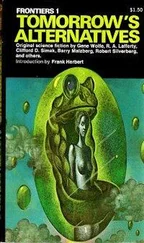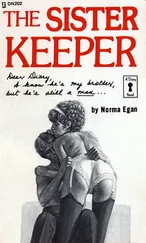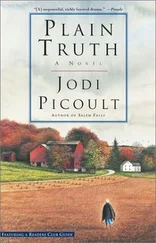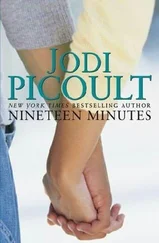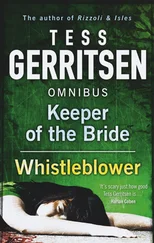When they leave, it is almost too easy. Some of the nurses hurry off to check on the patients who've rung in; others settle back behind their desk, trading hushed commentary about Jesse and my poor mother like it's some card game. They never look my way as I sneak out of the linen closet, tiptoe down the hall, and let myself into my sister's hospital room.
One Thanksgiving when Kate was not in the hospital, we actually pretended to be a regular family. We watched the parade on TV, where a giant balloon fell prey to a freak wind and wound up wrapped around a NYC traffic light. We made our own gravy. My mother brought the turkey's wishbone out to the table, and we fought over who would be granted the right to snap it. Kate and I were given the honors. Before I got a good grip, my mother leaned close and whispered into my ear, "You know what to wish for." So I shut my eyes tight and thought hard of remission for Kate, even though I had been planning to ask for a personal CD player, and got a nasty satisfaction out of the fact that I did not win the tug-of-war.
After we ate, my father took us outside for a game of two-on-two touch football while my mother was washing the dishes. She came outside when Jesse and I had already scored twice. "Tell me," she said, "that I am hallucinating." She didn't have to say anything else—we'd all seen Kate tumble like an ordinary kid and wind up bleeding uncontrollably like a sick one.
"Aw, Sara." My dad turned up the wattage on his smile. "Kate's on my team. I won't let her get sacked."
He swaggered over to my mother, and kissed her so long and slow that my own cheeks started to burn, because I was sure the neighbors would see. When he lifted his head, my mother's eyes were a color I had never seen before and don't think I have ever seen again. "Trust me," he said, and then he threw the football to Kate.
What I remember about that day was the way the ground bit back when you sat on it—the first hint of winter. I remember being tackled by my father, who always braced himself in a push-up so that I got none of the weight and all of his heat. I remember my mother, cheering equally for both teams.
And I remember throwing the ball to Jesse, but Kate getting in the way—an expression of absolute shock on her face as it landed in the cradle of her arms and Dad yelled her on to the touchdown. She sprinted, and nearly had it, but then Jesse took a running leap and slammed her to the ground, crushing her underneath him.
In that moment everything stopped. Kate lay with her arms and legs splayed, unmoving. My father was there in a breath, shoving at Jesse. "What the hell is the matter with you!"
"I forgot!"
My mother: "Where does it hurt? Can you sit up?"
But when Kate rolled over, she was smiling. "It doesn't hurt. It feels great."
My parents looked at each other. Neither of them understood like I did, like Jesse did—that no matter who you are, there is some part of you that always wishes you were someone else—and when, for a millisecond, you get that wish, it's a miracle. "He forgot," Kate said to nobody, and she lay on her back, beaming up at the cold hawkeye sun.
Hospital rooms never get completely dark; there is always some glowing panel behind the bed in the case of catastrophe, a runway strip so that the nurses and doctors can find their way. I have seen Kate a hundred times in beds like this one, although the tubes and wires change. She always looks smaller than I remember.
I sit down as gently as I can. The veins on Kate's neck and chest are a road map, highways that don't go anywhere. I trick myself into believing that I can see those rogue leukemia cells moving like a rumor through her system.
When she opens her eyes, I nearly fall off the bed; it's an Exorcist moment. "Anna?" she says, staring right at me. I have not seen her look this scared since we were little, and Jesse convinced us that an old Indian ghost had come back to claim the bones buried by mistake under our house.
If you have a sister and she dies, do you stop saying you have one? Or are you always a sister, even when the other half of the equation is gone?
I crawl onto the bed, which is narrow, but still big enough for both of us. I rest my head on her chest, so close to her central line that I can see the liquid dripping into her. Jesse is wrong—I didn't come to see Kate because it would make me feel better. I came because without her, it's hard to remember who I am
You, if you were sensible,
When I tell you the stars flash signals, each one dreadful,
You would not turn and answer me
"The night is wonderful."
—D. H. LAWRENCE, "Under the Oak"
WE NEVER KNOW, AT FIRST, if we are headed into a cooker or a smudge. At 2:46 A.M. last night, the lights went on upstairs. The bells went off, too, but I can't say that I ever really hear them. In ten seconds, I was dressed and walking out the door of my room at the station. In twenty, I was stepping into my turnout gear, pulling up the long elastic suspenders, and shrugging into the turtle-shell of my coat. By the time two minutes passed, Caesar was driving the engine onto the streets of Upper Darby; Paulie and Red were the can man and the hydrant man, riding behind.
Sometime after that, consciousness came in small bright flashes: we remembered to check our breathing apparatus; we slid on our gloves; dispatch called to tell us that the house was on Hoddington Drive; that it appeared to be either a structure fire or a room and contents fire. 'Turn left here," I told Caesar. Hoddington was only eight blocks away from where I lived.
The house looked like the mouth of a dragon. Caesar drove around as far as he could, trying to get me a view of three sides. Then we all piled out of the engine and stared for a moment, four Davids against a Goliath. "Charge a two-and-a-half inch line," I told Caesar, tonight's motor pump operator. A woman in a nightgown ran toward me, sobbing, three children holding her skirt. "Mija," she screamed, pointing. "Mija!"
"iDdnde esta?" I got right in front of her, so that she couldn't see anything but my face. "iCuantos anos tiene?"
She pointed to a window on the second floor. "Tres," she cried.
"Cap," Caesar yelled, "we're ready over here."
I heard the approaching whine of a second engine, the reserve guys coming to back us up. "Red, vent the northeast corner of the roof; Paulie, put the wet stuff on the red stuff and push it out when it's got somewhere to go. We've got a kid on the second floor. I'm going in to see if I can get her."
It was not, like in the movies, a slam dunk-a scene for the hero to go win his Oscar. If I got in there, and the stairs had gone… if the structure threatened to collapse… if the temperature of the space had gotten so hot that everything was combustible and ripe for flashover—I would have backed out and told my men to back out with me. The safety of the rescuer is of a higher priority than the safety of the victim. Always.
I'm a coward. There are times when my shift is over that I'll stay and roll hose, or put on a fresh pot of coffee for the crew coming in, instead of heading straight to my house. I have often wondered why I get more rest in a place where, for the most part, I'm roused out of bed two or three times a night. I think it is because in a firehouse, I don't have to worry about emergencies happening-they're supposed to. The minute I walk through the door at home, I'm worrying about what might come next.
Once, in second grade, Kate drew a picture of a firefighter with a halo above his helmet. She told her class that I would only be allowed to go to Heaven, because if I went to Hell, I'd put out all the fires. I still have that picture.
Читать дальше


